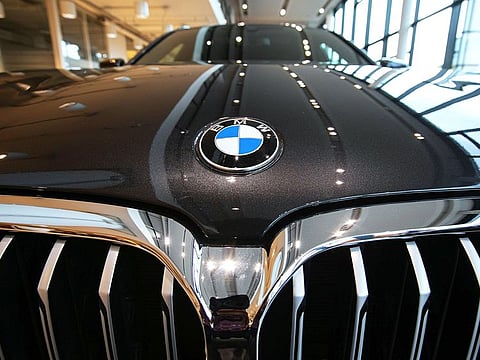BMW sparks up EV sales: i5 charges ahead with 310% surge
German powerhouse is electrifying fast, cracking self-driving tech code remains tough

BMW’s electric vehicle (EV) lineup had a turbocharged 2024, clocking 50,981 battery electric vehicle (BEV) sales — a zippy 12.3 per cent boost from the previous year, and a whopping 310 per cent spike in BMW i5 sales.
Throw in plug-in hybrids, and electrified models hit 70,379 units, snagging 19 per cent of the German automaker's total sales.
310% spike in BMW i5 sales
The stars of the lineup?
Let’s take a spin through the highlights:
i4: With 23,403 units cruising into owners’ garages, the i4 stayed on top, posting a 3.6 per cent gain.
i5: In its first full season, the i5 roared onto the scene with 8,763 units sold— a jaw-dropping 310.8 per cent growth. This one’s charging straight to the fast lane.
iX: This luxe cruiser faced tough roads. The iX moved 15,383 units, a dip of 11.1 per cent as rivals turned up the heat. It’s holding its ground, but the competition is fierce in the luxury EV market.
i7: Electric elegance: The flagship sedan wooed 3,431 buyers with its refined charm. It's modest 0.9 per cent climb shows it’s weathering a Q4 slowdown gracefully.
In the first nine months of 2024, BMW recorded a stunning 19.1 per cent surge in battery electric vehicle (BEV) sales, delivering a remarkable 294,054 fully electric models until September.
This was part of a strong year for BMW, with total US sales reaching 371,346 vehicles, a 2.5 per cent increase.
The BMW brand itself powered through with a 22.6 per cent rise, reaching 266,151 units, while its MINI counterpart delivered an electrifying performance with a 54.3 per cent leap in Q3 BEV sales, contributing 16,536 units.
But the road hasn’t been without its twists.
The overall BMW Group saw a 4.5 per cent dip in global deliveries, hampered by Integrated Braking System (IBS) delivery stoppages and softer demand in China.
Sales up in Europe, US up
Yet, BMW’s resilience shines in Europe, where it achieved a 7.6 per cent sales increase, cementing its dominance in the region.
The US market, though stable, reflects the company’s steady foothold in North America.
In the fourth quarter of 2024, BMW sales in the US hit 117,506 vehicles, a 8.9 per cent rise from the 107,881 vehicles sold in the Q4 2023.
Shifting gears
While the numbers show the company’s superior qualities in key metrics such as driving feel and car handling dynamics, it may not last long.
Behind the scenes, BMW faces a high-stakes challenge in the race to master full self-driving (FSD) software, a field dominated by fierce competitors.
As the industry shifts gears toward autonomous mobility, BMW’s ability to blend precision engineering with cutting-edge, software-driven innovation will determine whether it can outpace rivals.
BMW stands at the crossroads: Its future depends not just on selling compelling cars but on conquering the formidable frontier of autonomous driving — a race where the stakes couldn’t be higher.
BMW has a big -icture challenge, amid an industry facing disruptive innovations driven by AI.
That could mean going beyond competition, via collaborations in order to create greater value and future-proof the company.
Automation
BMW offers advanced driver-assistance systems (ADAS) that currently reach Level 2+ autonomy, which includes features such as:
Lane-keeping assistance
Adaptive cruise control with stop-and-go functionality
Automated parking systems, and
Traffic jam assist.
These systems require the driver's hands on the wheel and full attention, making them a support system rather than true autonomy.
Partnerships
BMW iNEXT: Launched in 2021, the iX SUV introduced enhanced autonomous features.
Collaborations: BMW teamed up with Intel, Mobileye, and others to develop autonomous systems, particularly aiming for Level 4 capabilities.
In 2019, BMW joined forces with Daimler (Mercedes-Benz) in a partnership to co-develop autonomous technology. This cooperation was later paused in 2020 due to strategic changes.
Challenges
BMW had ambitious plans for a Level 3 autonomous system by 2021 but faced setbacks in development and regulatory hurdles.
Like many legacy automakers, BMW struggles to match the speed and software-first approach of tech-driven rivals.
Current status
The most advanced feature, Highway Assist, is rolling out in newer models like the BMW 7 Series.
Level 3 automation has been discussed for limited releases, but it is still far from mass adoption, largely due to regulations and the high complexity of urban driving.
In an era of strategic openness, where technology serves human progress instead of simply going by old-school metrics, legacy automakers like BMW face the challenge of reinventing their identities.
That could mean aligning their operations and teams with rapidly-evolving consumer demands, EV mandates, and tech innovations, all while overcoming the weight of entrenched supply chains, regulatory scrutiny, and the growing threat from agile, tech-driven competitors like Tesla and BYD
Sign up for the Daily Briefing
Get the latest news and updates straight to your inbox



